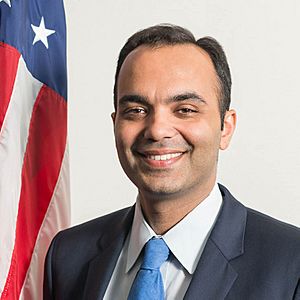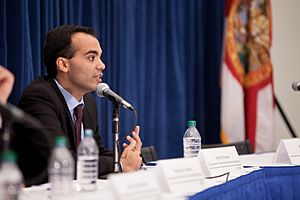Rohit Chopra facts for kids
Quick facts for kids
Rohit Chopra
|
|
|---|---|
 |
|
| 3rd Director of the Consumer Financial Protection Bureau | |
| In office October 12, 2021 – February 1, 2025 |
|
| President | Joe Biden Donald Trump |
| Deputy | Zixta Martinez |
| Preceded by | Kathy Kraninger |
| Succeeded by | Zixta Martinez (acting) |
| Commissioner of the Federal Trade Commission | |
| In office May 2, 2018 – October 12, 2021 |
|
| President | Donald Trump Joe Biden |
| Preceded by | Joshua D. Wright |
| Succeeded by | Alvaro Bedoya |
| Personal details | |
| Born | January 30, 1982 Plainfield, New Jersey, U.S. |
| Political party | Democratic |
| Education | |
| Signature | |
Rohit Chopra (born January 30, 1982) is an American who served as the third director of the Consumer Financial Protection Bureau (CFPB). He was also a member of the Federal Trade Commission (FTC). Before these roles, Chopra was an assistant director at the CFPB. He was also the agency's first Student Loan Ombudsman. This role was created by the Dodd–Frank Act.
In 2017, President Donald Trump chose Chopra for a spot on the Federal Trade Commission (FTC). The U.S. Senate approved him without any "no" votes. He started his work on May 2, 2018. At the FTC, Chopra supported looking closely at how large technology companies like Google and Facebook operate.
Chopra is known as an ally of Senator Elizabeth Warren. He worked with her at the CFPB. He believes in stronger rules for banks and other financial groups. In 2021, President Joe Biden picked him to lead the Consumer Financial Protection Bureau. Chopra is closely involved with efforts to improve the system of student loans in the United States.
Contents
Early Life and Education
Rohit Chopra was born on January 30, 1982. His family is Indian-American. He grew up in Plainfield, New Jersey.
College and Graduate School
Chopra graduated from Harvard University in 2004. He earned a Bachelor of Arts degree there. While at Harvard, he was the president of the student body. He was known for being a strong advocate for students.
After Harvard, Chopra went to the Wharton School of the University of Pennsylvania. He received a Master of Business Administration in 2009. He also received a Fulbright Fellowship to study in South Korea. Before working for the government, he worked at McKinsey & Company. This is a company that advises businesses worldwide.
Starting His Government Career
After the 2008 financial crisis, a new law called the Dodd–Frank Wall Street Reform and Consumer Protection Act was passed. This law led to the creation of the Consumer Financial Protection Bureau (CFPB). Chopra helped set up this new agency.
Working at the CFPB
At the CFPB, Chopra worked as the Student Loan Ombudsman. This means he helped people with problems related to their student loans. He also served as an assistant director. During his time, the agency took action against some for-profit colleges. These included Corinthian Colleges and ITT Educational Services. Both of these schools later closed down.
Chopra has often spoken about the large amount of student loan debt in the United States. In 2012, he shared information showing that student debt was over $1 trillion. He also helped write a report that found a plan to overcharge military members on their student loans. Chopra explained his focus on student loans to The Wall Street Journal. He said he wanted to help people who were struggling with debt.
After His First Time at CFPB
In 2016, Chopra joined the Department of Education. He worked as a senior advisor there. Later in 2016, he was part of Hillary Clinton's team. She was running for president at the time.
Chopra then became a Senior Fellow at the Consumer Federation of America (CFA). This group works to protect consumers. In 2017, Chopra released a report. It showed that over 1 million Americans had trouble paying their student loans in 2016.
Serving on the Federal Trade Commission

In 2017, Senator Chuck Schumer suggested Chopra for a spot on the Federal Trade Commission (FTC). President Donald Trump officially nominated him. The Senate approved him on April 26, 2018. Chopra officially started his role on May 2, 2018. He was the second Asian-American to serve on the FTC.
While at the FTC, Chopra supported looking into the business practices of "Big Tech" companies. These included Google and Facebook. In 2020, Chopra disagreed with the FTC's $170 million agreement with Google. This agreement was about child privacy. He felt the penalty was not strong enough. He also thought the $5 billion agreement with Facebook was not enough. That agreement was about the company's data practices.
Chopra has said that the government should "investigate how technology platforms may be a threat to our civil rights." In 2020, he wrote a paper with Lina Khan. It was about how to make rules for "unfair methods of competition."
Leading the Consumer Financial Protection Bureau
During the 2020 United States presidential election, Chopra was considered for a position in President Joe Biden's team. He was mentioned as a possible Secretary of Commerce. But he was eventually nominated to lead the Consumer Financial Protection Bureau (CFPB). Alvaro Bedoya took Chopra's place at the FTC.
Senator Elizabeth Warren praised Chopra's nomination. She said she worked closely with him to set up the CFPB. She also said he fought for students. The Senate confirmed Chopra on September 30, 2021. Vice President Kamala Harris cast a special vote to help confirm him.
His Time as Director
As CFPB director, Chopra was also a member of the Federal Deposit Insurance Corporation (FDIC). While in office, Chopra looked closely at how large tech companies were getting involved in payments. One of his first actions was to investigate companies like Amazon, Apple, Facebook, Google, PayPal, and Block, Inc.'s platform Square. He also looked into bank overdraft fees.
In October 2022, Chopra announced that the agency would start making rules about data sharing. This was based on Section 1033 of the Dodd–Frank Act. This section is about open banking. In October 2023, the CFPB shared its proposal. If approved, banks would have to give consumers their financial data for free. The rule would also stop companies from using personal financial information for targeted advertising.
Rohit Chopra's term as director ended on February 1, 2025.
Challenges Faced by the CFPB
Under Chopra's leadership, the CFPB faced some challenges. In 2022, some banking groups filed a lawsuit. They claimed Chopra was going beyond the agency's legal power.
In 2023, the agency had a data security incident. An employee wrongly transferred personal information of many consumers to a private email. The agency called it a "major data breach." This event led to an investigation by Congress.
In January 2024, the agency settled a lawsuit. This lawsuit was brought by minority employees and women in 2018. They said they faced unfair treatment, including lower pay and being denied promotions. As part of the agreement, the agency paid $6 million. The agency did not admit to any wrongdoing.
 | Roy Wilkins |
 | John Lewis |
 | Linda Carol Brown |

